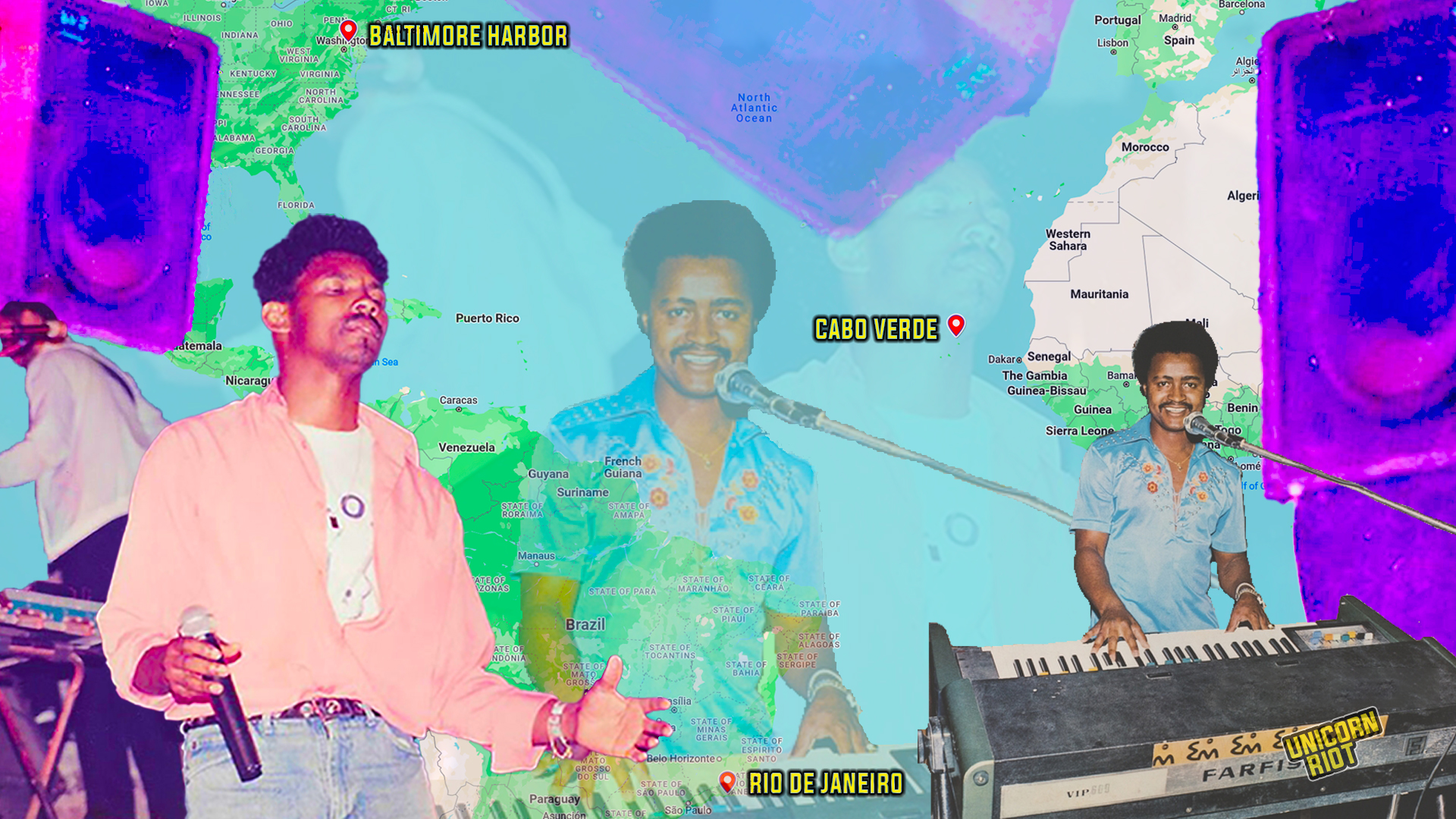📡 – 2023-08-11
At this point I have seen plenty of art made with AI tools. And I have seen some which were impressive. But the “Wow!” always has a particular sense: “Wow! Computers know how to do this?” Never “Wow! Someone knows how to get a computer to do this?” What awe exists is in a very tech-centered place – it is impressive how technology has progressed, and less impressive that the public can coax such things out of that technology.
For me, this bungles many of the value propositions of the technology, the promise its most fervent boosters claim it holds, and the art it produces. An artist uses ChatGPT, Midjourney, DALL•E, etc, not unlike a miner uses a pickax: digging, and hoping to strike something of value. Moving this much and that much up and down, and further into the depths looking for something of value not yet excavated. This is not making something, but finding something previously made. This is true in more than once sense concerning AI, as these technologies are themselves built to endlessly recombine vast rivers of prior art. Such seeds bear appropriate fruit: even if the fact a computer made it is surprising, AI works are often dull at the content-level. They are usually bland averages of the source material’s most common tropes and clichés.
I struggle with myself because I want to be all encompassing when it comes to art practice. I want to claim all is art, and artful, if someone says so. I want people to feel empowered to create, and proud of their creations. I want to see parallels to crate digging, as an excavation-like search for the already-made; I want to appreciate generated images as, perhaps, a kind of hyperfuturistic approach to collage; I want to wonder if this is not fine art, but in some sense folk art. But I can’t get over a mental hurdle – or perhaps an emotional one? I can only see these tools as toys. I see them akin to an etch-a-sketch, or LEGO: media in which occasionally impressive things happen, but which remain fundamentally silly. Perhaps this is unfair, but the bar to clear this thought is high.
Recently I had the opportunity to hear a number of experts (none of their fields were artificial intelligence, or computer science) talk about their thoughts on the state of AI. More than one expert talked about people needing to “re-skill” as “prompt engineers”: those who type things into the box. The implication being: if they would be replaced at their jobs by AI tools, they should learn to guide the AI tools to do its (their) work.
Is this what people mean when they say that more, and more powerful, generative tools will free humans from the drudgery of work? This sounds an awful lot like additional drudgery. Is this what people mean when they say AI will help more people be more creative? Prompt engineer does not, to me, immediately beg comparison to novelist, dancer, painter. But perhaps in time my view will be considered conservative, even retrograde.
Or perhaps my mind will change when / if Prompt Engineer is elevated to the level of author, lets say: the particulars of the pursuit detailed, dissected and romanticized to where we might have some shared understanding of what their process entails, within one, and across many works, and what cultural position they occupy. Or perhaps it’s simply a waiting game. At some point, maybe the societal role of Prompt Engineers will calcify, clarify. Maybe they will become the architects of our visual landscape in a manner more significant than I’m able to imagine, given my reflexive lack of charity.
Something tells me, though, that Prompt Engineers will only ever be the tools of enterprise, and of capital. They will be alienated from their creations – which will be touted as immaculately conceived by corporate tools. AI Generated works do not now – and I will be surprised if they ever – have significantly appreciated creators beyond the technologies used to generate them, and the organizations that own those technologies. But maybe this is the chicken and the egg … we cannot have auteur AI artists until their process is understood and respected; we cannot understand and respect the process of an auteur AI artist until we have one.
Or perhaps this is how the technology is meant to work: not principally as a tool for the exploration of the depths of meaning, and humans’ role in its creation, but principally as tools to generate profit, and please shareholders.
Anyway … on to the stuff I liked!
👂
5hrs of synth madness from the foremost practitioner of such; pay what you wish
New extended sonic exploration from Japanese artist Lemna; moody, textural.
Dark edm from the prolific Nairobi artist Slikback. Never disappoints; also pay what you wish.
📚
The New Prophets of Empathy: Machines will not free us to pursue our most human callings

The New Prophets of Empathy | Leo Kim
Will the coming AI revolution reveal and nurture the indispensable core of our being, as some utopian tech fiends like to think? Probably not!
The notion that automation will naturally redeem empathy as a core human trait is premised on a fundamental misunderstanding. Our essence is not an empirical fact waiting to be found through a process of elimination; our notions of it are socially formed. In this way, technology can obfuscate our emotional depth, positioning us as just another component of its cold apparatus. Critically, these effects tend to be distributed unevenly. Neda Atanasoski and Kalindi Vora, the authors of Surrogate Humanity: Race, Robots, and the Politics of Technological Futures, note that automation has historically depended “upon a fantasy of robotics tied to the history of racial slavery and the myth of a worker who cannot rebel.” Race, gender, and class all contribute to whether one might be “empowered” by AI or subjected to its mechanistic logic.
An A.I. Utopia Is No Place For Humans
https://bloodknife.com/ai-utopia-no-humans/The law regarding A.I. generated art and copyright is currently ambiguous. Although long-standing doctrine from the USPTO suggests that works that are wholly created by an algorithm or some other form of machine cannot be copyrighted (since only the human creator of a work can hold its initial copyright), future court rulings are likely to overturn this standard. The tech companies that own these algorithms are enormously wealthy and powerful; artists are not. Whether these algorithms are simply a sophisticated form of photobashing, unable to actually create anything original, is irrelevant. Capital’s continued ability to extract profit from labor seems to depend on the use of A.I., and courts will inevitably reach an outcome that favors or at least facilitates this.
Welcome to Lore Core

The Laws of Lorecore – ZORA ZINE
Curator-in-Residence Shumon Basar welcomes us to our new age of narrative collapse and private mythologies.
NOTE: from Dec. 2022
Against this punishing “Proceleration” (the acceleration of acceleration) is the desire to label every micro-sub-cultural moment on the internet. Everything is a “—core.” If it isn’t a —core, did it even happen? Cores are like screenshots as trends. And once the —core is indexed and archived, you move on. A decade ago, the trend forecasters K-Hole infamously birthed “Normcore,” only to witness it go virally stratospheric and make hundreds of millions of dollars for brands without K-Hole making a single (known) dime from any of it. K-Hole’s story with Normcore is their own Lorecore—albeit not one they set out entirely to achieve. Sometimes the —core is way bigger than its author. Of such myths are unicorns made.
Shipwrecked Synthesizers: How Electronic Music Came to Cabo Verde

Shipwrecked Synthesizers: How Electronic Music Came to Cabo Verde - UNICORN RIOT
The archipelago of Cabo Verde had already been colonized by the Portuguese for hundreds of years in 1968 when a ship carrying synthesizers marooned on its shores.
After the shipwreck, the synthesizers remained locked up seeing that they were of no use to a community without electricity. But once Amílcar Cabral learned about the shipment, he had another idea in mind.
Still banking on the aloofness of the Portuguese to his PAIGC, the anti-colonial leader arrived in the Verdean archipelago and suggested the instruments be distributed equally to the buildings that had access to electricity – most of them being schools.
“Cabral told them to take the instruments to the lowlands,” says Peres, “One of the few places with electricity, saying that ‘no Portuguese will think to look there because it’s in their house.’”
The synthesizers were welcomed in the presence of curious children and young people. Although their music was banned, these young students already had music in their blood and rhythms passed down through generations in their souls.
Once they figured out how to turn the new instruments on, songs began to flow almost immediately. Overnight, Cabo Verde’s youth became the owners and operators of some of the most exciting music technology of that time
Avid to Be Acquired by STG for $1.4B

Avid to Be Acquired by STG for $1.4 Billion – The Hollywood Reporter
The maker of the Media Composer editing system and Pro Tools audio post tool expects the deal to close during the fourth quarter.
“We are excited to partner with Jeff and the management team to build on the company’s history of delivering differentiated and innovative content creation and management software solutions. We look forward to leveraging our experience as software investors to accelerate Avid’s growth trajectory with a deep focus on technological innovation and by delivering enhanced value for Avid’s customers.”
YouTube will now show a blank homepage if you don’t have watch history on
/cdn.vox-cdn.com/uploads/chorus_asset/file/23986639/acastro_STK092_03.jpg)
YouTube will now show a blank homepage if you don’t have watch history on - The Verge
The homepage will look a lot different if your watch history is off.
“We are launching this new experience to make it more clear which YouTube features rely on watch history to provide video recommendations and make it more streamlined for those of you who prefer to search rather than browse recommendations,” Google writes.
📹
👾
I have seen so many clips of Baldur’s Gate 3 that look so amazing and fun and weird that I am this close to giving it go – but I simply do not have the time for, like, a 300 hour game! Are y’all playing? How are you finding it? If I can only sit down to play for like, an hour here and there or a couple hours on the weekend, am I just going to get frustrated? It seems like there is a LOT of inventory management (which I love!) (but …) (y’know … )
😎
Fun City returns at the end of this month; keep an eye on the feed for a schedule update in the next week or two! Other than that … I’ll have other stuff to share with you in the next month or so, if all goes according to plan. 🤐
✌️
That’s all I got and it’s all yours! I hope you had a nice week, have a nice weekend. And if you’re of a mind, feel free to tell your pals about this here little newsletter of stuff:

Add a comment: